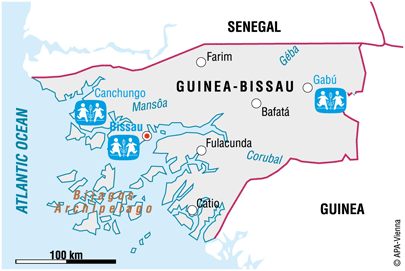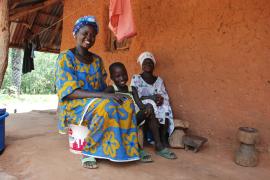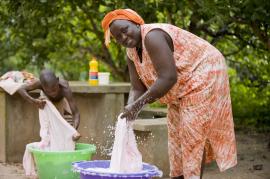
Vi er i Guinea-Bissau
Decades of political instability
In 1998, an attempted coup d'état against his government led to the Guinea-Bissau civil war. Vieira was finally ousted in 1999 as a result of military mutiny. However, he managed to be re-elected in 2005, promising substantial national reconciliation, economic development and political stability. In 2009 he was assassinated by renegade soldiers. The Guinea-Bissau armed forces were responsible for human rights violations that included arbitrary detention, arrest and even torture and murder during the country's civil war.
Legislative and presidential elections have generally been declared free and relatively fair by international observers. However, military intervention and the drug trade have substantially undermined the authority of elected officials and corruption is widespread.
Guinea-Bissau has become an important transit hub for Latin American drug cartels moving cocaine to Europe. Officially, farming and fishing represent the two major pillars of Guinea's economy. However, the growing importance of drug trafficking as an economic factor is difficult to ignore.
The country relies heavily on foreign aid as conflict and political instability have had a considerable impact on Guinea-Bissau’s infrastructure.
More than 20,000 affected by cholera outbreak in 2005
Guinea-Bissau is one of the poorest countries in the world. Once praised as a role model for development in Africa, a vast proportion of the population is now struggling to survive. Hundreds of thousands live without access to potable water, sanitation and medical infrastructure, particularly in rural areas. At 47 years, life expectancy at birth is one of the lowest in the world. Major infectious diseases include diarrhoea, hepatitis A, typhoid fever, malaria and HIV.
Thousands of people, especially children, continue to die from preventable, curable diseases. There have been regular cholera outbreaks, e.g. in 2005 when more than 20,000 cases were recorded and hundreds lost their lives. HIV/AIDS also remains a public health problem in Guinea-Bissau; around 2.5 per cent of the population are HIV-positive.
Children in need of protection from human trafficking
Although the government has made serious efforts to tackle child trafficking, cases of children who are bought, sold and transported from their homes are reported frequently. Many of these children are trafficked to Senegal and Mali to work in agriculture or forced to engage in begging. The trafficking of human beings continues to be a multibillion-dollar business in some parts of Africa.
Nearly half of all Guinean children aged five to fourteen are working, a large number of them without attending school . In rural parts of the country, families often depend on the extra income generated by their working children. In rural zones, children do farm work and cattle herding. For four months of the year, during the annual cashew harvest, many children are withdrawn from school temporarily to assist their parents in the fields.
Child prostitution also remains an issue of growing concern in Guinea Bissau. Girls are reportedly trafficked internally for commercial sexual exploitation. Violence against women and girls, including forced and early marriages, is generally widespread. A 15-year-old girl was beaten to death in April 2009 for refusing to marry an older man. Although the case had been reported, no one faced criminal charges.
The under-five mortality rate in Guinea Bissau remains very high at 193 per 1,000 live births. Nearly one in four children is born underweight and roughly 20 per cent of Guinean children suffer from malnutrition. In rural areas, these figures are particularly high as regular access to food, potable water and medical assistance remains extremely difficult.
110,000 children in Guinea-Bissau have lost either one or both of their parents, many of them because of AIDS. The AIDS epidemic in Sub-Saharan Africa is leaving thousands of children orphaned at an early age. Child-headed households are common. Many young children have to put their education on hold so that they can take on caregiving responsibilities in the family.
SOS Children's Villages in Guinea-Bissau
Tens of thousands of children in Guinea-Bissau live in poverty. It was against this background that the government approached SOS Children's Villages in 1984, requesting us to start working in the country.
During the civil war, the organisation carried out an SOS Emergency Relief Programme in order to provide the immediate neighbourhood of the SOS Children's village with food, water and medical supplies.
At present, SOS Children's Villages is helping Guinean children and young people in need by providing day care and education in three different locations. When children can no longer stay with their families, they are cared for by their SOS mothers in one of the SOS families.

